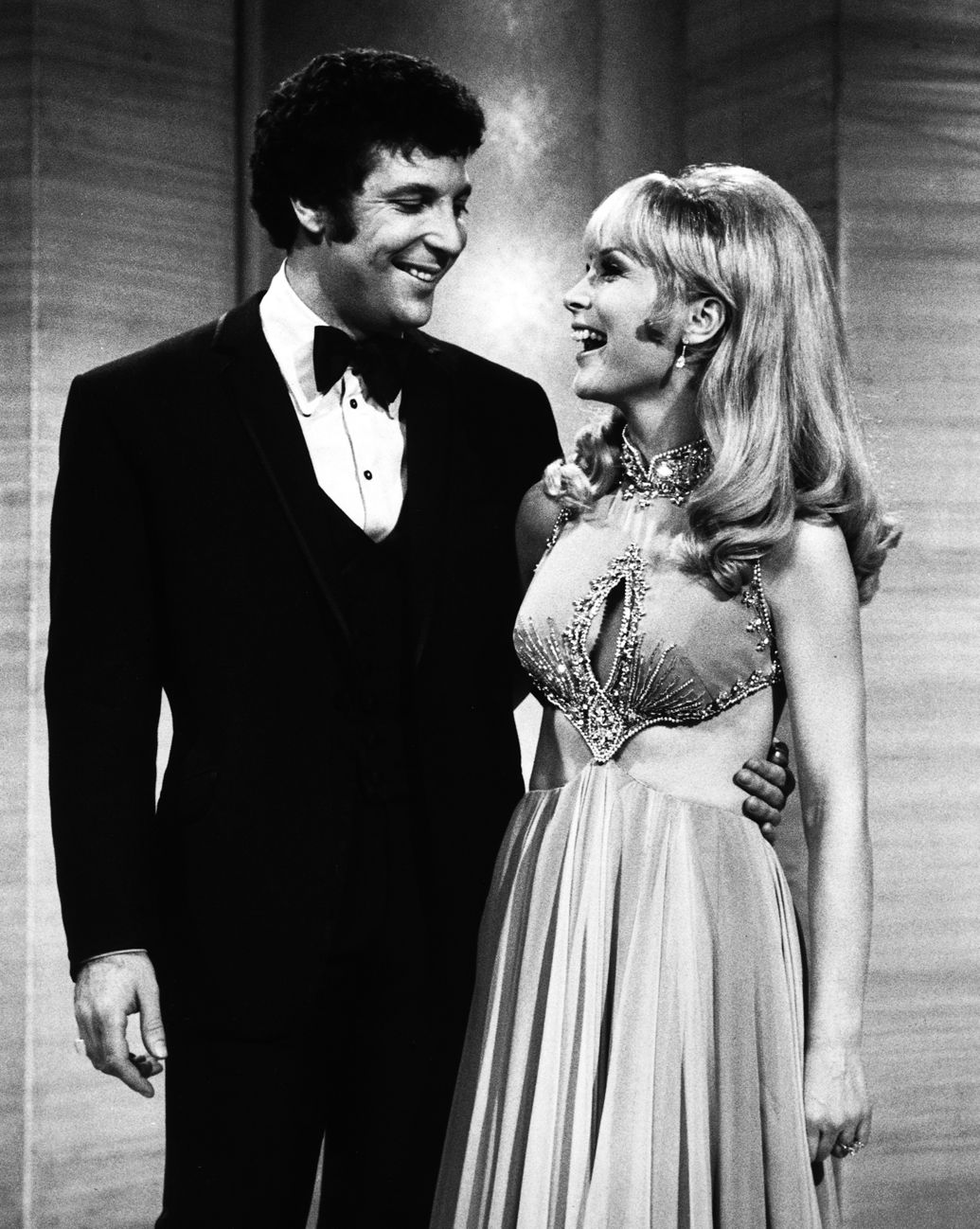Tom Jones on Meeting Elvis, Recording With Bacharach, 'Panty Magnet' Phase
"I'm still like, 'Was it me? Did I dream it all?'" says singer of storied 50-year career

Now 75, and decades after becoming Presley's close friend and witnessing the iconic rocker's physical decline, Jones is talking again about Elvis. He's on a small stage at Apogee Studio in Santa Monica, California, for an intimate performance hosted by KCRW-FM and recorded for broadcast and streaming December 22nd. The live audience is limited to 180.
During an onstage interview with DJ Anne Litt, Jones tells funny stories of his surreal first meeting with the King of Rock & Roll and how the pair sang to each other in a shared hotel bathroom. But soon, he's back at the microphone singing "Elvis Presley Blues" by Gillian Welch.
"I was thinking that night about Elvis, the day that he died, the day that he died," he starts, to a quivering tremolo guitar, his voice solemn and pleading. The sound couldn't be further from the bold and brassy pop songs that launched Jones' career as a hit-maker in the Sixties and Seventies, starting with the Number One 1 U.K. hit "It's Not Unusual" in 1965. This is more like a sermon. "And he shook it like a holy roller, baby/With his soul at stake ..."
His time with Presley is just one story Jones shares in his just-released autobiography, Over the Top and Back. It coincides with a new album, Long Lost Suitcase, the third in a series of releases produced by Ethan Johns that reintroduce the singer as a raw and soulful interpreter of stripped-down folk, blues and rock & roll. Both the book and album have taken him back across the decades, recounting all the people and places that he's seen.
"It still boggles my mind," Jones tells Rolling Stone, sitting in the offices of Apogee before his performance. His hair and goatee have gone gray, and on his right hand is a ring with the flag of Wales. "I'm still like, 'Was it me? Did I fuckin' dream it all?'"
The day he first shook hands with Elvis was in 1965 on the lot of Paramount Studios in Hollywood. Presley had asked to meet the young Welsh singer, whose new single was "With These Hands." At the studio, Jones could see Presley "walking towards me," he recalls, and then begins a vocal impression of Elvis singing, "'With these hands...' Oh, fuck."
"He said to me, 'How the hell do you sing like that?' And I said, 'Listening to you, for one thing' — and Jerry Lee Lewis and Chuck Berry, Fats Domino, Mahalia Jackson, and things that he was influenced by. He said, 'Yeah, but I was brought up there. I went to black gospel churches. Is there anything like that in Wales?' I said, 'No, I was listening to it all on the radio.' Like all of us did in Britain."

Decades later, Jones was one of the 10 singers requested by honoree Bob Dylan to sing at this year's MusiCares Person of the Year tribute. Jones can't imagine such a request coming from Dylan back in 1968. "No way. Bob Dylan must have hated me," he says with a laugh.
Some critics labeled Jones' music as schlock mainstream entertainment with no connection to the rising counterculture of the Beatles, Stones and Dylan. And yet, back in Treforest, Wales, Jones had begun much like those contemporaries, performing rock and R&B covers in a village band he led called Tommy Scott and the Senators. It was his first stage name. (He was born Thomas Jones Woodward in 1940.)
He found a manager, changed his name to Tom Jones, and recorded a debut album that was a wide mixture of pop vocals, ballads and "some rip-roaring shit," Jones says now. But it was the urgently effervescent "It's Not Unusual," with Jones' muscular come-hither baritone, that topped the U.K. chart and reached Number 10 in the U.S.
He piled up other hits in the same accessible pop vein that decade, including "Delilah," "Help Yourself" and "Thunderball." Jones was on Decca Records with the Rolling Stones, but the distance between them grew even further during his four-hour recording session on Burt Bacharach and Hal David's "What's New Pussycat?" It was the theme song for a 1965 movie comedy and played into his growing image as a sex-symbol crooner in open shirts and tight pants. Jones hesitated, then dove right into the song.
"I thought, 'I'm going to punch the shit out of it on "What's New Pussycat?"' And Burt said, 'That's what I want. It's a crazy song for a crazy film. ... I have to have a voice of authority.' It's sort of a backhanded compliment: 'I've got to have you, but this is the song,'" he says with a laugh.
 Since Jones was not a songwriter, the direction of his music was limited to the songs that were available, he explains. The same kind of material kept coming his way. "They were iconic records. I'm not saying I don't like them," he adds of the hits. "When Burt convinced me to do that song, it took a while. He did say, 'This is not a rhythm & blues song.' Soul music had kicked in by then, and I wanted to do Wilson Pickett songs, Solomon Burke, Sam and Dave, and Otis Redding. But I wasn't getting the songs."
Since Jones was not a songwriter, the direction of his music was limited to the songs that were available, he explains. The same kind of material kept coming his way. "They were iconic records. I'm not saying I don't like them," he adds of the hits. "When Burt convinced me to do that song, it took a while. He did say, 'This is not a rhythm & blues song.' Soul music had kicked in by then, and I wanted to do Wilson Pickett songs, Solomon Burke, Sam and Dave, and Otis Redding. But I wasn't getting the songs."
From 1969 to 1971, he hosted This Is Tom Jones, a weekly TV variety show that the singer used as a means to stretch out and collaborate with his musical heroes and contemporaries, from Jerry Lee Lewis and Little Richard to Aretha Franklin and Crosby, Stills, Nash & Young. The show began in London, but moved to Hollywood after it was picked up by ABC, where mainstream entertainment like Robert Goulet and Barbara Eden dominated the agenda.
"ABC Television was looking for the middle-of-the-road people to come on," Jones recalls. "So I said, 'I'll sing with Barbara Eden, but I've got to have Jerry Lee Lewis.' They said, 'Jerry Lee Lewis hasn't been on a major network TV show since he got banned!' And I said, 'I'd like to change that,' because Jerry Lee influenced me more than anybody in the Fifties."

His career veered into camp when female fans began throwing their underwear at Jones during concerts. He became known as a "panty magnet" after one woman was seen offering her underwear to the singer mid-show.
"She took them off and I said, 'Watch you don't catch cold,'" Jones says laughing. "But it backfired on me. Somebody wrote it up in the papers, so they were bringing them in handbags. Fuck me, what have I done!"
By the late Eighties, Jones was being embraced by a new generation of admirers, beginning with a cover of Prince's "Kiss" with Art of Noise, reaching Number Five in the U.K. and the Top 40 in the U.S. In 1999, Jones released Reload, an entire album of duets, including team-ups with Van Morrison, the Pretenders, Portishead and the Cardigans. In 2002, Wyclef Jean produced the album Mr. Jones.
A crucial late-career collaboration began in 2010 after producer Ethan Johns picked Jones' name from the roster of Island Records in the U.K. Johns created an understated organic setting for Jones' powerful vocals. "He said, 'All your records, all your hits, have always had big arrangements. Why don't we get back to the meat of it?' I said, 'Great!' And I thought maybe, finally," Jones says, laughing, "50 years after."
The new album includes a jangly bluegrass reading of the Stones' "Factory Girl," Willie Nelson's romantic ballad "Opportunity to Cry" and Hank Williams Sr.'s bittersweet "Why Don't You Love Me Like You Used to Do?" Fans have accepted his new sound, Jones says. He still does the hits, but rearranged to fit the mood of his current releases. At Apogee Studio, "Delilah" begins as a ballad, then builds with layers of accordion and a slicing electric guitar solo. "I haven't thrown those songs away. I've just reshaped them."
His voice has also endured some inevitable changes over the decades. He notes that whatever he's lost in upper-register range is balanced with the depth of experience.
"When I listen to my old records, I like them because there's a lot of piss and vinegar in them," Jones says. "I'm still up there in certain places, but the mid-range and bottom end are much richer — and my brain, experience. There's an old saying: 'You can't put old hair on young shoulders.' So you've got to have lived to sing certain songs.''
Article by: Steve Appleford for Rolling Stone Magazine
Pictures: Michael Kovac/WireImage/Getty/Hulton Archive/Larry Hirshowitz/ABC Photo Archives.
Article available here
